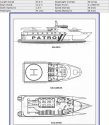The Chinese Navy is using Australian technology to upgrade its warships, a move which experts warn may be detrimental to Australia's national security.
Through a joint venture company based in China, an Australian business, AMD, has sold designs for the hull and propulsion system of high-speed catamarans to the Peoples' Liberation forces.
The Chinese military has built vessels based on those designs and then armed them with weapons systems including anti-shipping missiles.
A former senior Australian intelligence official is warning that although the situation is legal under Australian law, it is not an ideal situation for Australia's national interest.
But the company involved believes there is no way to stop China applying civilian technology to its military.
AMD Marine Consulting is a very successful catamaran design business, with a joint venture company called Sea Bus International based in China.
The Chinese Government has previously bought the company's catamaran designs for civilian use, such as passenger ferries.
The Chinese Navy liked the speed and stability of the catamaran's hull and propulsion machinery so much that it bought the AMD design to use for its fleet.
Details of the deal were published late last night by The Interpreter, a blog run by the Lowy Institute for International Policy.
Its author is Sam Roggeveen, a former senior analyst with one of Australia's key intelligence bodies, the Office of National Assessments.
"China has become the first country to develop a missile-armed catamaran, and the hull design that they've used for this missile armed catamaran comes from a subsidiary company, or rather a joint venture company that was set up by AMD with a Chinese partner," he said.
He says there is nothing illegal about the deal: "The Defence Department have told me that AMD is not breaking any laws."
Mr Roggeveen says the main armament of the ships is between four and eight sea-skimming anti-shipping missiles and the catamarans are "essentially designed to sink other ships".
Australian companies export about $600 million a year worth of military products.
These exports are strictly monitored by the Defence Department and Customs, and the companies involved have to apply for licences.
The restrictions also apply to civilian products with military applications.
Mr Roggeveen warned that the Royal Australian Navy could come up against the new ships in the event of a conflict over Taiwan.
"If it ever came to a shooting war in Taiwan, and I'm not saying this is likely, but it is a possibility that a lot of strategic analysts point to, then there's a good chance, if it came to that, that Australia would come in on the US side to defend Taiwan against Chinese military action," he said.
"Now in that situation, it's quite plausible that Australia would send a naval contingent, and a naval contingent would be at direct threat from these catamarans."
But he says it is "very difficult" to police exports of all products with the potential for military use.
"But just because it's blurry doesn't mean there isn't a line," he said.
AMD technical director Allan Soars is currently overseas and agreed to respond to the ABC's questions via email.
He was asked if he thought AMD's business with the Chinese Navy was in Australia's national interest.
"It's difficult to answer, as we're talking about a hypothetical situation," he said.
"Of course it would be unfortunate if these vessels were to be involved in a conflict with Australian forces.
"We didn't design a weapon and sell the blueprints to China; we designed fast ferries and set up a joint venture design company in China to commercially exploit our designs, just as many Australian companies are selling products and technology into China.
"What is to stop China putting any product developed for commercial purposes into military use?
"Any number of Australian raw materials could be on these vessels, such as the steel for the shafting system, the copper in the wiring, even the lead in the bullets.
"The only way to prevent the crossover of Australian commercial material into the Chinese military is to stop trading with China completely.
"And we are constantly being told by experts that the more we trade with China, the less likely we are to face an armed conflict with them."
After the Tiananmen Square massacre in 1989, Europe and the US banned arms sales to China.
Europe has controversially reviewed its position, although the US strictly adheres to the ban and the Pentagon has expressed concern about China's recent military expansion, in particular the upgrade of its naval fleet.
Australia has no blanket ban on defence sales to China, but applies various considerations, including human rights and potential usage.


